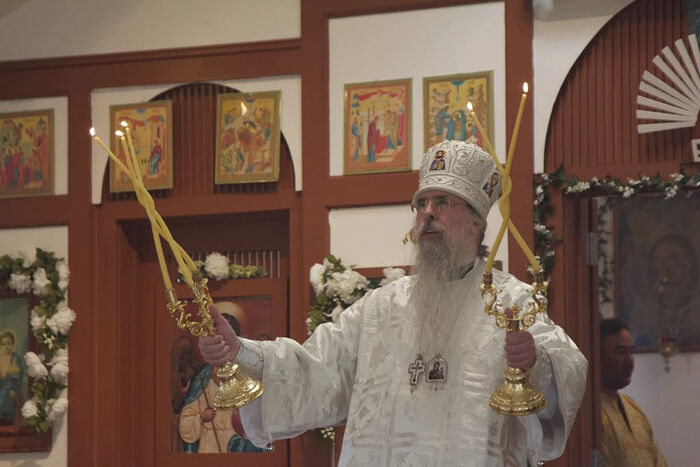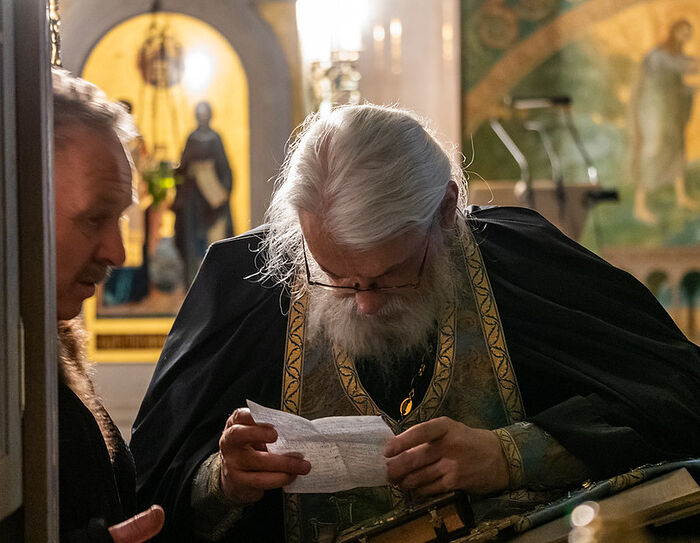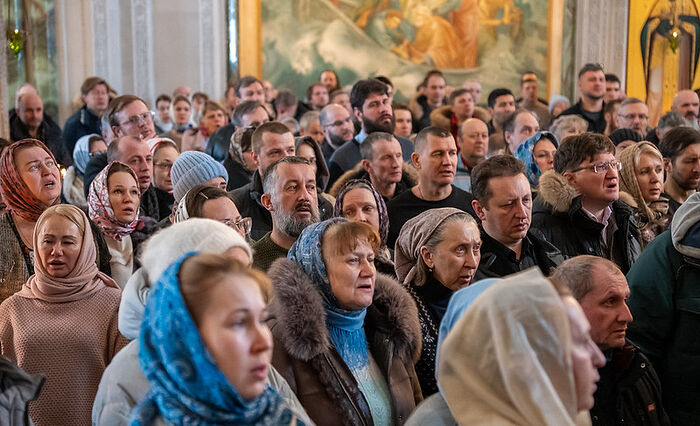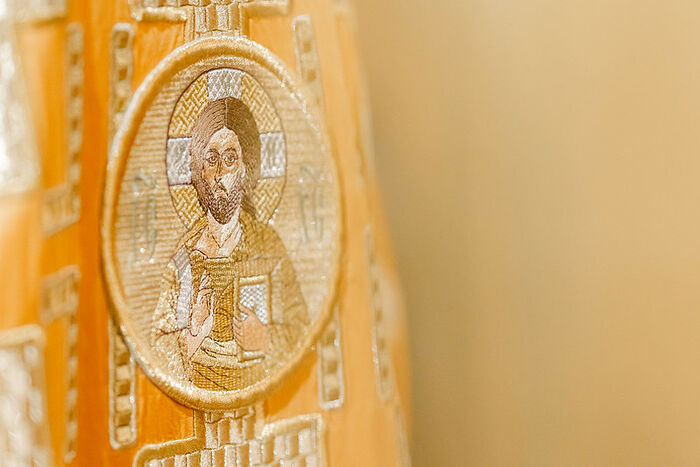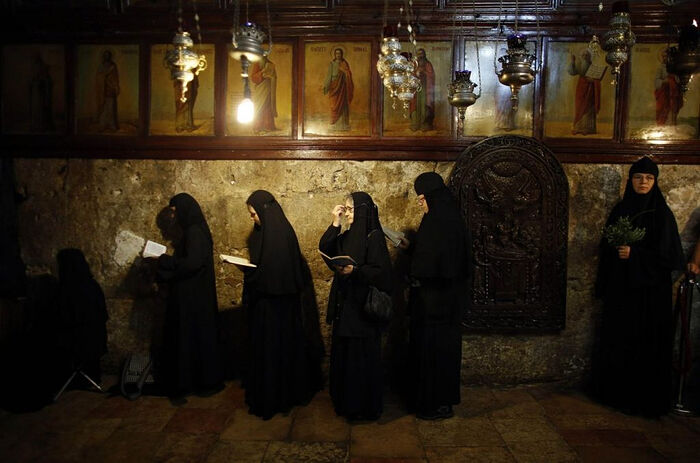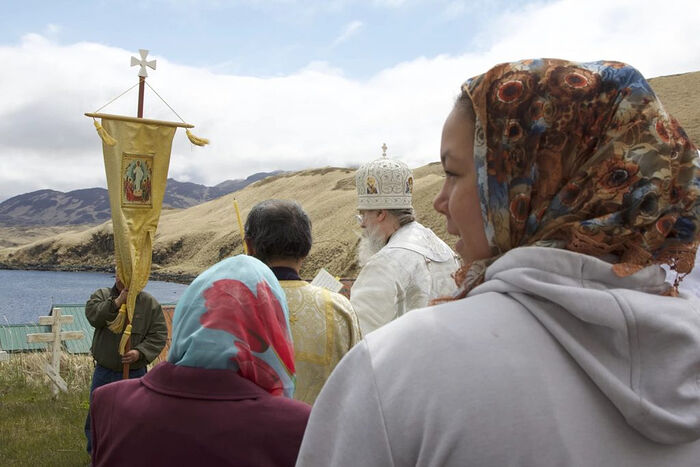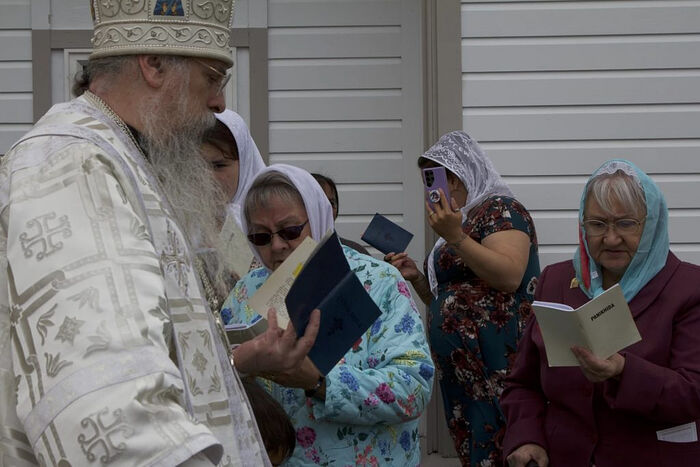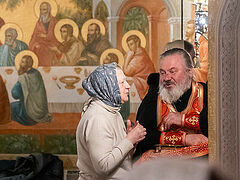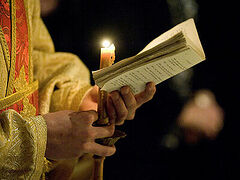—Vladyka, bless. My first question is: It is sometimes difficult for believers to find a confessor, many do not have one. How would you advise such people?
—Go to confession to any priest who is available and make a good confession. There are many books about how to confess that can be found and read. It is very important to prepare for confession: to pray, to explore your life since the last confession. How have you spent your time with respect to your neighbor, yourself, and your God. Were my actions pleasing to God or not? Thus, a person notes everything that needs confession, every spiritual wound to the heart. He writes down everything he wants to say so as not to forget anything but instead to confess everything. That soul will receive God’s grace when the prayer of absolution is read over him. So, the first thing one needs to focus on is confessing as well as you can. Then, he needs to find a priest who is available. It is important to want to change and pray that God will enlighten the priest to whom you go, and give him the right word for you. Sometimes the priest will say very little other than, “be patient and pray.” Receive that word with gratitude, remembering what is most important—that by participating in the mystery of confession, you receive the grace of God, and your sins are forgiven. This alone should encourage you not to stop on the path to salvation and move forward.
Of course, it’s a great blessing if a person has a good confessor. But even if someone cannot find that confessor, it is possible for Christians to lead a very serious spiritual life in Christ, a blessed life in which you change from the worse to the better, a life through which you will feel a taste of Heaven.
—If a person still has a confessor, how should this spiritual relationship be built so that it is correct and pleasing to God?
—It seems to me that any confessor needs to look at the person coming to him from a specific perspective. It is to see a person not only as he is at the moment, but also as he can become by the grace of God when he overcomes his passions. A person changes if he follows the commandments of God, if he lives the life of the Church. You need to look at a person from this perspective. How does God look at a person? As being in His image. God wants us to reveal His image in ourselves. And this is our starting point. The confessor sees what a person can become, and his main task is to support him, to encourage him to live a churchly life. Such a life includes regular participation in the sacrament of Confession, in Communion with the blessing of the priest, in the struggle against the passions, in the pursuit of humility. And when all this is present in a person’s life, such spiritual relationships eventually transform his life and become a blessing for him.
—Vladyka, at the University of Thessaloniki you studied patristics and psychology, and defended your doctoral thesis. What is the main cause of depression in modern people? How can they get rid of this condition?
—A depressed person views his life as black. Everything around him is dark. His future seems to him dark and hopeless. Such a person also sees himself in a dark light, he does not see anything good inside himself. But for Christians, if they are real Christians, there is a different perspective of looking at themselves and the world. Of course, there are passions within Christians that they are trying to overcome, but they also see the virtues that need to be developed and the prospect of their development.
When a Christian looks around him, he sees his brothers and sisters, each one of them as an image of God. He goes to church and kisses the holy icons there. And he understands that he is not alone in this world, that there is a “cloud of witnesses” around him (Hebrews 12: 1), a truly great multitude of holy witnesses. When a Christian looks forward to his future, he sees the possibility that he will enter the Kingdom of Heaven, that he will abide forever with Christ, with the King of all, with the Most Holy Theotokos, the Heavenly Queen and with all the saints. And thus, it is already very difficult to stay depressed.
I think that it is very good for Orthodox Christians to always remember the examples of the holy martyrs who held on to the holy Orthodox faith to the very end and thus received their crowns. These holy martyrs became triumphant in their struggle for Christ, and they were joyful at the moment of their martyrdom, which we read about in their lives. They knew that they would be tortured, that they would have to endure much physical pain. People around them hated them, mocked them, and they endured it all. In the end, after all sorts of torments, everything ended in physical death. If you look at the feat of the martyrs from a worldly point of view, they should have been the most depressed people in the world. But what do we see? They remained joyful. And all because they turned their eyes to Christ and felt that He was with them in all His power.
It seems to me that the solution to the problem of depression would be to change the way a person looks at the world, a kind of μετάνοια (Greek: change of mind.—A. K.). It is necessary to change this view from secular, mundane, spiritless to a sacred spiritual perspective and start looking at the world with the eyes of faith. Of course, there are clinical cases of depression, when the cause of the illness is a chemical imbalance in the human brain. But, of course, even this state is very much influenced by the way a person looks at the world. Does he look at the perspective of the Gospel and the holy fathers? Or is it a godless view, as if there were no God? In the latter case, we must admit that this is the outlook of a fool: The fool says in his heart: there is no God (Ps. 13:1).
There are many people who look like believers. They go to church, venerate the icons, are baptized, but, unfortunately, these are people of little faith, whom the Lord in the Gospel calls, ye of little faith (Mt. 6:30). What does a believer of little faith need? We need to pray: “Lord, send me more faith, such a strong faith as that of the saints.” And if we have faith like the saints, if we have the same love for Christ as the saints, then we will have the same joy as the saints. Then we will understand what the holy Apostle Paul meant when he said, Always rejoice (1 Thess. 5: 16). And that’s really what we Christians need.
—Is it possible for a modern person to acquire faith as strong as the saints had?
—To gather such faith, prayer is necessary and important: “Lord Jesus Christ, Son of God, have mercy on me a sinner.” We need prayer before going to bed; prayer when we wake up; prayer throughout the day. Love for Christ is important. We need to look for opportunities to please Him. In every situation, we have a choice whether to act according to the passions or to do what is pleasing to God. We should always ask ourselves: “How can I react to this or that situation in a way that will be most pleasing to my beloved Lord Jesus Christ?” You have to act based on this. And then, Christ will send us a little of His grace every time. If we gradually acquire God’s grace in our hearts, it will help the grain of faith in our hearts to grow. And a beautiful fragrant flower may appear from this watered seed.
Each of us has a living heart that beats, loves and hurts. And we need to try to love Christ more, to grow in love for Him, to love the Mother of God more, to try to be more obedient to the commandments of Christ. Some describe this increase as a ladder, some as climbing a mountain. But the essence does not change, it involves spiritual growth. And it shouldn’t be abrupt, with lunges, no. It should be done softly, gradually, step by step. Remember, as the Savior said: And whosoever shall give to drink unto one of these little ones a cup of cold water only in the name of a disciple, verily I say unto you, he shall in no wise lose his reward (Matt. 10: 42). The small steps that Christians take because they are Christians and want to show God that they love Him will all together grow. And eventually a person will become a saint. Again, I would like to emphasize that this is a matter of faith. We have examples of saints, including modern ones, who show with their lives that holiness can be achieved.
—Vladyka, please tell me, have you met people yourself who could be called saints? Could you tell us about your experience with them?
—Yes. I think I’ll name a few who are known to everyone. For example, I met the Venerable Elder Ephraim of Katounaki. I once climbed into his cell in the Katounaki, which was in a hard-to-reach place. But then I was young and was able to do it. He was already old and blind; he couldn’t see anything. He was surrounded by his disciples. He gave me his blessing. And I, an inexperienced young novice, felt at that moment that I was in the presence of a spiritual giant of impressive strength. He resembled a prophet from the Old Testament, like the prophet Moses. This is a sanctity that can be felt like a thunderbolt.
I also met St. Paisios of the Holy Mountain. What can I remember about him? His extreme kindness, simplicity and great humility. At that time, I was just a novice; let’s put it bluntly—nothing and nobody. But this holy man came up to me and asked for my blessing (probably seeing that the novice would become Bishop Alexey one day.—A. K.). He showed great humility towards me. I also met the Venerable Elder Aimilianos from the monastery of Simonospetras. This meeting was probably one of the most important in my life. I came to Simonospetras together with a brother from my monastery who was a hieromonk. The Elder spoke with the hieromonk, but didn’t have time to speak with me, a novice. This was only right from the elder’s perspective. But before coming to Mount Athos, I had read about this elder and really desired to speak with him. I admit, I was a little upset that he did not have time for me, but had time to speak with my companion. I went to the cave of St. Simon and made prostrations. And at some point, one of the monks came up to me with the words: “The elder now says he will receive you.” I immediately went to him.
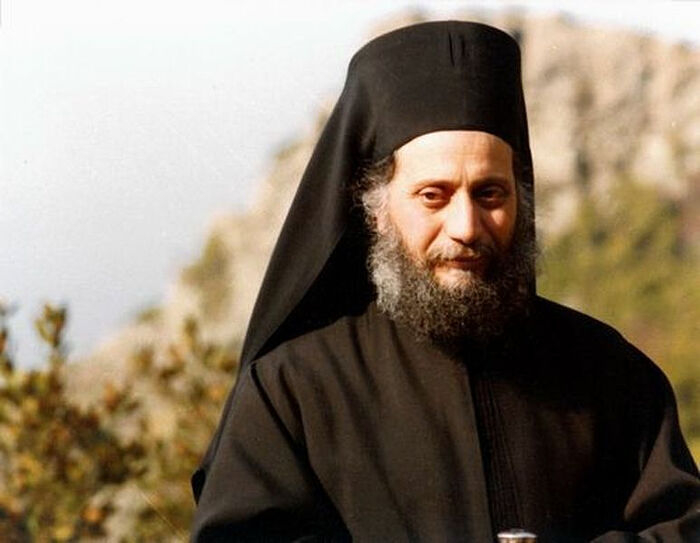 Schema Archimandrite Emilian (Vafidis)
Schema Archimandrite Emilian (Vafidis)
As I mentioned, this meeting was one of the most important in my life. The elder told me much about what would happen to me later. He gave me some advice on how to keep the fire of faith in my heart, the joy of Christ. But together with his words, I was impressed by the fact of his presence next to me, his sweet and peaceful smile that remained on his face.
And it is also necessary, perhaps, to talk about the abbot of the Karakallou monastery, where I became a brother and received the great angelic schema from Archimandrite Philotheos. He was a disciple of Elder Ephraim of Philotheou. His special kindness and love deeply touched my soul. I remember once when he prayed. I was next to him then and felt like the sun was shining next to me with real warmth.
All these people were united by sincere love for everything and everyone, in simplicity with fervent faith in God.
—You served in the women’s monastery of St. Demetrius in Nea Kerdyllia. Do you think there is a difference between men and women’s monasticism? Why are there so few women among the saints glorified by the Church?
—Of course, the essence of monastic life is the same for everyone in any monastery. Men, by the way, often note that women are more successful in arranging their monasteries. Nuns are the best cooks, the best gardeners, they decorate the monastery usually more beautifully than the monks. The main difference, in my opinion, is the greater refinement of the female soul, which is visible through these external manifestations.
The image of monastic life is the same for everyone, and the achievement of holiness happens differently for everyone. The nuns try to humbly please God, to do the will of God in their lives, while the monks strive to become spiritual athletes, exhausting themselves with fasting and a number of prostrations. I also think that the monks are trying to somehow acquire in the heart a drop of the tenderness that the Mother of God has, because by nature men have less of it. And the nuns see the feat of the martyrs and try to gain more masculinity and perseverance as a virtue. These are the differences, in my opinion. But the goal of all monastics is the same—to live in Christ. This is common and most important.
As for the saints, we have the Most Important Saint—the Most Holy Theotokos. St. Nicodemus of the Holy Mountain said that She is the second in the Kingdom of Heaven to the Holy Trinity. Remember how we have a service for all saints after Pentecost, when we honor saints, known and unknown? To be honest, I’m not sure there are more men in the Kingdom of Heaven than women. The only thing I think is that the appearance of a holy man is more noticeable on earth than a holy woman. This is probably the reason why there are more men among the saints.
—You have translated the books about St. Paisios of the Holy Mountain from Greek into English. Please tell me about it.
—I translated two books about him in obedience to my abbot. The first was written by Hieromonk Isaac, it was the biography of Elder Paisius (according to which later a Russian team made a multi-series film about the saint.—A. K.).
The second book was called, The Guru, the young man, and Elder Paisios. It was about a young man who visited Elder Paisios. But, still searching for the truth, he went to India and visited ashrams there. The translation of this book was requested from Australia, where there were many young people who also visited India, looking for the truth in Hinduism. And so I translated it first. In particular, there are beautiful teachings about Elder Paisios, his holiness and simplicity. I confess that it was not easy for me to work on this book, but I know that in the end it was useful for many people.
—Tell us about your ministry in Alaska. What difficulties and joys do you have?
—Alaska is such a wonderful place where beautiful people live! I never thought I would become a bishop in this state. But here I see the Providence of God. You know, there’s even something in common between Greece, where I served for a long time, and Alaska. There are many Orthodox villages here. And it is a great joy for me that many locals identify themselves as Orthodox. They are not Russians, but many of them had Russian ancestors, maybe great-great-grandfathers, great-great-grandmothers. And this is quite common. Thanks largely to the marriages of Russians with indigenous people, Alaska at one time became Orthodox. To this day, you can see many echoes of Russian culture here. It is a great joy for me to visit local Orthodox parishes.
But there are, of course, difficulties. When Russia sold Alaska to America in the nineteenth century, the American government began to exert great pressure on the Orthodox. Protestants, Baptists, Methodists, Presbyterians and representatives of other denominations were sent here. People in the government had the idea of completely wiping out every trace of Russian Orthodoxy in Alaska. They closed Russian parish schools all over Alaska because they spoke Russian. Moreover, they tried to suppress the Indian languages spoken here; that is, they tried to destroy the local culture, so that they would adopt American culture.
We have very few priests now. Under my direct supervision there are eighty parishes and a total of twenty priests for all these parishes. A century after those harsh events, the existence of the Orthodox Church in Alaska is a miracle of God. After all, it could have been completely destroyed through American missionaries of other denominations who came here with the Bible in their hands.
Recently we celebrated the Nativity of Christ, and my parishioners sang, “Thy Nativity O Christ our God” (he sings in Church Slavonic). My heart rejoices when I hear them. I was in one parish in a place called Atka, and the Atka faithful sang for me the Christmas troparion in Church Slavonic. They are very proud to have known St. Yakov, since the Orthodox Church functioned there in the nineteenth century. They haven’t had a permanent priest since then. And when we served there, the whole village came to confession, and then to the Liturgy, to Communion. To be honest, I see modern little miracles happening to my dear Alaskan flock.
Of course, being here is God’s blessing for me. Yes, it’s very difficult, but it’s truly a blessing. And any priest from Russia who gets to these places will be able to serve the Liturgy here without hindrance. We will be very happy. The priests of our diocese look towards Russia with great love.
In general, people in Alaska still have a warm love for Russian priests, because when Russian Orthodox Christians came here, back in the eighteenth century, they did not destroy anything, but on the contrary, supported the local native population. And what did they do? They added to the local culture faith in our Lord Jesus Christ and the beauty of the Orthodox faith. When Americans came here, they tried to destroy both the faith and culture of indigenous nationalities, wanting to make them regular Americans. It’s wonderful here, of course, and I’m very happy and grateful to God for being and serving in Alaska.
—Vladyka, you visited Russia. Please share your impressions of our country.
—Oh, it was a great joy for me to visit Russia and Moscow! I was very touched by the wonderful beauty of Russian churches, beautiful divine services, the deep piety of Russian people, and their warm hospitality! I pray that the Lord will allow me to visit your country again.
—What could you say in parting to Russian believers?
—I’d probably just remind them of what they already know. Orthodox believers are of the true faith, and there is no other. I am the way and the truth and the life” (Jn. 14:6). Holy Orthodoxy is the treasure of all treasures. Therefore, people need to adhere to the holy Orthodox Church, they need to regularly participate in the Church’s Sacraments, they need to read the Lives of the Saints, to have the Jesus prayer both on their lips and in their hearts. Try to restore everything that was holy and sacred in Holy Russia, observe the Church fasts and feasts. And then the Russian faithful will make Russia radiant. And it will become what it should be—a light for the rest of the world, glorifying God. Amen.
Note from the author concerning the word “agape” (ἀγάπη) of Greek origin used in the title. One of its meanings is unconditional love. It is often found in the New Testament to indicate love for God and neighbor.

